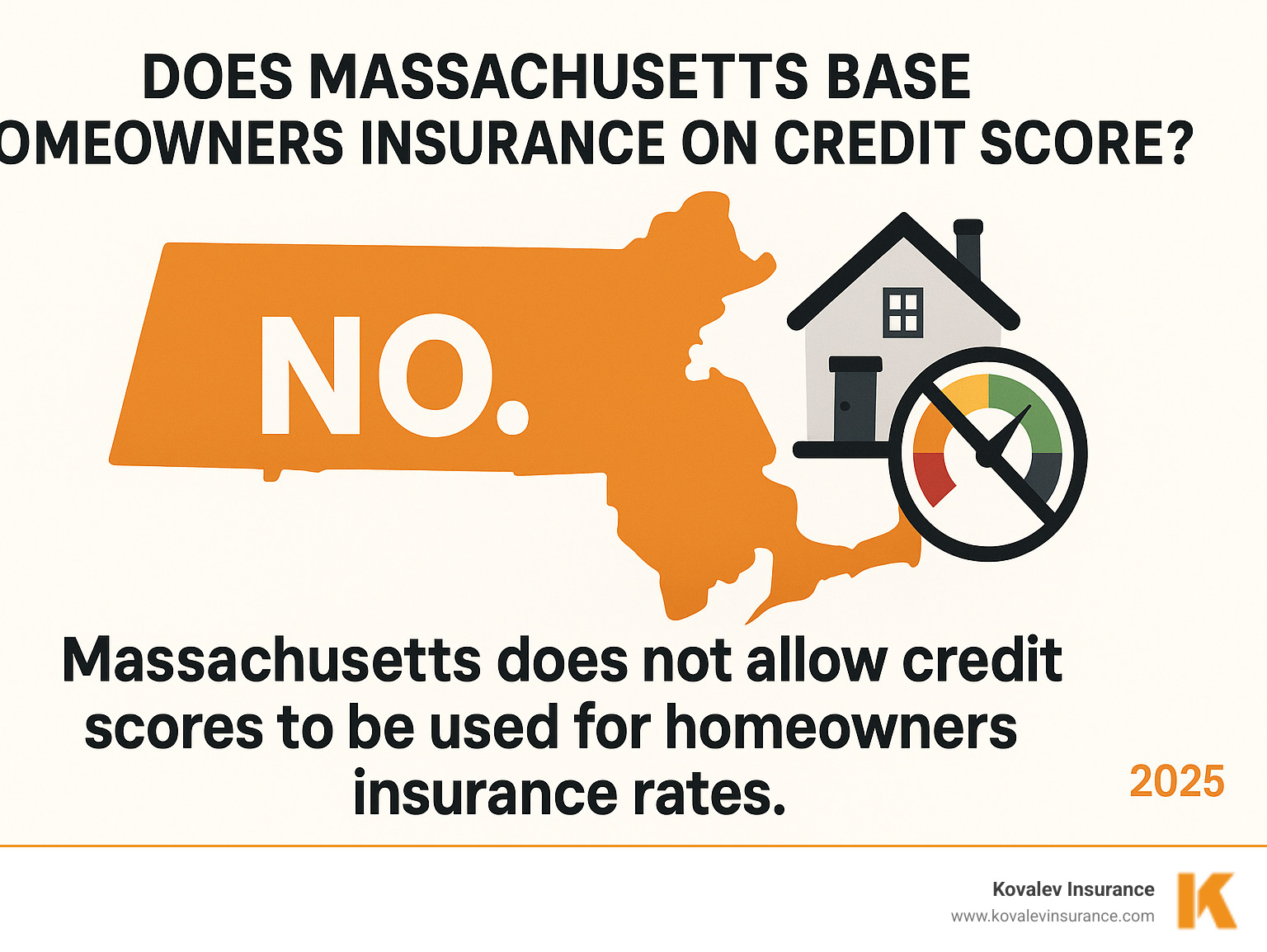Blog Content
3
Aug
2025

Many homeowners wonder how their financial history impacts their insurance rates. Specifically, does Massachusetts base homeowners insurance on credit score?
Here's the quick answer:
No. Massachusetts is one of the few states that does NOT allow insurance companies to use your credit score when setting your homeowners insurance rates.
In Massachusetts, your credit score simply isn't a factor for homeowners insurance. This sets Massachusetts apart from most other states. While insurers elsewhere might use your credit history to help predict how likely you are to file a claim, that's not how it works here in the Commonwealth, from Boston to Newton, Wellesley, and Brookline.
My name is Michael Kovalev, and as the owner of Kovalev Insurance Agency Inc., I've been helping Massachusetts residents steer complex insurance questions like does Massachusetts base homeowners insurance on credit score for years. Our agency has grown by focusing on personalized solutions and understanding the unique regulations of our state's insurance market.

Does massachusetts base homeowners insurance on credit score terms to remember:
Here's the straightforward answer: No, Massachusetts does not base homeowners insurance on credit score. This is actually written into state law, making Massachusetts one of only a few states that truly protect consumers from credit-based insurance pricing.
Massachusetts stands alongside California and Maryland in this consumer-friendly approach. While most states allow insurance companies to peek at your credit history when setting your rates, the Commonwealth said "not here" and banned the practice entirely for homeowners insurance.
This isn't just a suggestion or guideline—it's Massachusetts General Laws working to ensure fair insurance practices. So whether you're buying a home in Newton, Brookline, or anywhere else in our state, your credit score simply won't factor into your homeowners insurance premium.
For a complete picture of how homeowners insurance works in our state, check out our 2025 Guide to Homeowners Insurance in Massachusetts.
The reasoning behind this law is pretty solid when you think about it. Consumer advocacy groups and state regulators recognized that using credit scores for insurance pricing just isn't fair—and can hurt the people who need affordable coverage the most.
Here's the thing: your credit score tells a story about your financial past, but it doesn't predict whether you'll file a homeowners insurance claim. Life happens. Maybe you went through a divorce, lost a job, or faced medical bills. These situations can ding your credit score, but they don't make you more likely to have a tree fall on your roof or a pipe burst in your basement.
The use of credit scores can disproportionately affect minority households and low-income families, as research has consistently shown. When the pandemic hit, for example, many financially responsible homeowners saw their credit scores drop through no fault of their own. Should they pay more for homeowners insurance because of temporary financial hardship? Massachusetts said no.
By focusing on actual property risk instead of personal financial history, our state ensures that insurance underwriting regulations serve everyone fairly. It's about equity—making sure your insurance premium reflects the risk of insuring your home, not the contents of your wallet.
Massachusetts is swimming against the current here, and that's actually great news for homeowners. In most other states, insurance companies routinely use credit-based insurance scores as part of their risk prediction models. They argue that people with lower credit scores file more claims, so they should pay higher premiums.
The difference in what you pay can be shocking. In states that allow credit scoring, homeowners with poor credit often face premiums that are significantly higher than those with excellent credit. We're talking about hundreds or even thousands of dollars more per year—just because of a credit score.
But here in Massachusetts, that doesn't happen. A homeowner in Needham with a 550 credit score pays the same base rate as someone in Wellesley with an 800 credit score (assuming their homes and coverage are similar). The state-by-state variation in this practice makes Massachusetts a real standout for consumer protection.
This approach means Massachusetts residents can focus on what really matters: finding the right coverage for their homes at fair prices based on actual risk factors. To learn more about how costs are actually determined in our state, visit Understand Home Insurance Costs in Massachusetts.
Since does Massachusetts base homeowners insurance on credit score is a definitive "no," you're probably wondering what insurance companies actually look at when setting your rates. The good news is that Massachusetts insurers focus on factors that make logical sense – things directly related to your property and the actual risk it presents.

When we work with homeowners throughout the Greater Boston area – from Newton's historic neighborhoods to Wellesley's tree-lined streets – we're looking at real, tangible factors. Your home's location, its replacement cost, age, construction type, and claims history all play important roles. The protective devices you've installed, your chosen deductible, and liability limits matter too. And if you're near the coast, that proximity brings its own considerations.
These factors create a complete picture of your home's risk profile, which is exactly what should determine your insurance rates. After all, a well-maintained home with modern safety features in Needham should be priced differently than an older property without updates, regardless of the owner's credit history.
For deeper insights into how these factors work together, check out our resources on Massachusetts Home Insurance Cost Insights and Affordable Home Insurance Tips in Massachusetts.
The physical reality of your home is the foundation of your insurance rate. Think about it – insurers need to understand what they're actually protecting and what risks they're taking on.
Replacement cost versus market value is often misunderstood. Your insurance company doesn't care what your home would sell for (that's market value, which includes the land). They care about how much it would cost to rebuild your home from scratch if it were completely destroyed. That gorgeous crown molding in your Brookline Victorian or the custom stonework on your Natick colonial? Those details can increase rebuilding costs and, naturally, your premium.
Building materials and construction type make a huge difference. A home built with fire-resistant materials will typically qualify for better rates. The type of roofing – whether it's basic asphalt shingles or impact-resistant materials – affects your premium. Your foundation type, siding materials, and overall construction quality all factor into the equation.
Square footage and the year your home was built are straightforward factors. Larger homes cost more to rebuild, so they cost more to insure. Older homes, especially those with original plumbing, electrical, or heating systems from decades past, can present higher risks. However, updates like new wiring, a modern roof, or upgraded plumbing can help offset age-related concerns.
Proximity to fire protection matters more than many homeowners realize. Homes closer to fire stations and with easy access to fire hydrants are simply less risky to insure. Response time can mean the difference between minor damage and total loss.
Coastal versus inland risk is particularly relevant here in Massachusetts. Properties in coastal communities face higher risks from hurricanes, nor'easters, and storm surges. Even inland towns like Natick or Belmont have varying risk profiles based on local weather patterns and specific neighborhood characteristics.
What you choose to cover and how you've handled claims in the past significantly impact your rates.
Your deductible choice directly affects your premium. Choosing a higher deductible – say $1,000 instead of $500 – will lower your monthly premium because you're agreeing to pay more out-of-pocket before insurance kicks in. It's a trade-off between upfront costs and ongoing premiums.
Liability coverage limits protect you if someone gets injured on your property or you accidentally damage someone else's property. Higher liability limits provide better protection but increase your premium. Given today's lawsuit-happy environment, many homeowners in Newton and Wellesley opt for higher limits for peace of mind.
Endorsements and personal property coverage let you customize your policy. These additions might include extended replacement cost coverage, sewer backup protection, or scheduled coverage for valuable items like jewelry or art. Replacement cost coverage for your belongings costs more than actual cash value coverage, but it means you'll get enough money to buy new items rather than depreciated values.
Your claims history is tracked in something called a CLUE report (Comprehensive Loss Underwriting Exchange). Frequent claims, especially for preventable issues, signal higher risk to insurers. They want to see stability and responsibility in your claims history.
For a comprehensive look at what your Massachusetts home insurance can cover, our guide What Does MA Home Insurance Cover? breaks down all the details.
Beyond the basics, some specific features can bump up your rates, while others can bring them down.
Swimming pools, trampolines, and certain dog breeds can increase your liability risk. While Massachusetts insurers can't use your credit score, they can decline coverage or exclude liability for certain situations. Some insurers might require specific safety measures for pools or exclude coverage for certain dog breeds entirely. If you have questions about specific breeds, our article on MA Home Insurance and Pit Bull Dogs provides helpful insights.
Protective devices are your friends when it comes to discounts. Security systems, fire alarms, smoke detectors, and carbon monoxide detectors show insurers you're proactive about protecting your property. Even smart home technology can sometimes qualify for discounts.
Bundling your home and auto insurance is one of the easiest ways to save money. Most insurers offer significant multi-policy discounts, and it simplifies your insurance management. At Kovalev Insurance, we often see clients save hundreds of dollars annually through smart bundling strategies. Learn more about Smart Auto Home Insurance Bundles.
Loyalty discounts, newer home discounts, and non-smoker discounts are often available but not always advertised. Long-term customers frequently qualify for additional savings, and homes built within the last few years often get preferential rates. Always ask your agent about all available discounts – you might be surprised at what you qualify for.
We've made it clear that does Massachusetts base homeowners insurance on credit score is a firm "no" here in the Commonwealth. But even though your credit score won't impact your home insurance rates in places like Newton or Wellesley, understanding concepts like credit-based insurance scores, FICO scores, and different types of credit inquiries (like soft inquiry vs. hard inquiry) is still super helpful! Why? Because if you ever move to another state, or even if you're just looking into other types of insurance (like auto insurance, which can use credit scores in some states), these terms might pop up. Being a well-informed consumer is always a win, and it helps you feel more in control of your financial responsibility!

Okay, so what exactly is a credit-based insurance score, often called a CBI? Simply put, it's a special number that many insurance companies in other states use. Their goal with this score is to guess how likely someone is to file an insurance claim in the future. This isn't the same as your regular FICO score or VantageScore that banks use when you apply for a loan. Those scores tell lenders how likely you are to pay back money you borrow. A CBI score, on the other hand, is trying to predict if you'll make an insurance claim that costs the company money.
Even though both scores look at your credit report, they have totally different recipes! Imagine your credit report is a giant cookbook. A FICO score recipe picks ingredients to predict if you'll pay your bills on time. A credit-based insurance score recipe picks ingredients to predict if you'll file an insurance claim. The two predictions are very distinct.
In states where they're used, these scores look at things like your payment history (do you pay bills on time?); how much outstanding debt you have (high debt can sometimes raise a red flag); the length of your credit history (a longer history of managing credit well is a good sign); if you're constantly seeking new credit (opening lots of new accounts quickly); and your credit mix (having different types of credit, like a credit card and a car loan, can be seen as positive).
As the National Association of Insurance Commissioners (NAIC) clearly explains, credit-based insurance scores are calculated differently than typical credit scores, even if they use the same basic information. The idea behind it is that people who are financially responsible (or not) might also be more (or less) likely to file an insurance claim. But here in Massachusetts, we don't worry about that for your home insurance!
This is a question we hear a lot, and it's a really smart one to ask! We're here to tell you that you can breathe a sigh of relief. When you're shopping around for homeowners insurance quotes – whether you're in Brookline, Natick, or anywhere else in Massachusetts, or even another state – the insurance company will usually do what's called a "soft inquiry" on your credit report.
Think of it like this:
A soft inquiry is like taking a quick, quiet peek at your credit information. It happens when you check your own credit score, or when a company does a background check. This kind of inquiry does not hurt your credit score at all. In fact, most other lenders won't even see it. It's just a way for the insurer to get some general information.
A "hard inquiry," on the other hand, is a bigger deal. This happens when you apply for new credit, like a mortgage for your new home, a car loan, or a brand-new credit card. A hard inquiry tells other lenders that you're actively looking to take on more debt, and it can temporarily ding your credit score by a few points.
So, the great news is, you can shop for as many homeowners insurance quotes as you want, and it won't ever negatively impact your credit score. It's a really smart move to compare rates to make sure you're getting the best deal for your home, and you can do it with total peace of mind, knowing your creditworthiness is safe!
Massachusetts truly stands out as a champion for consumers when it comes to home insurance and credit scores. We've talked about it a lot, but it's worth repeating: our state, right alongside California and Maryland, has strict laws that completely ban using credit scores to set your homeowners insurance rates. While a few other states, like Hawaii or Washington, might have some limits, they often don't go as far as Massachusetts does. Our state regulations are clear and strong on this point.
Now, compare that to almost every other state across the U.S. In most places, insurance companies are allowed to use those credit-based insurance scores we just discussed. And what does that mean for homeowners? Well, it can mean huge differences in what people pay! If you have excellent credit in those states, you might get a great rate. But if your credit isn't so stellar, you could end up paying way, way more – sometimes 60% or even over 200% higher premiums! One study even showed a homeowner in South Dakota paying nearly three times as much if they had poor credit compared to someone with excellent credit. That's a massive difference just based on a credit score.
This is why Massachusetts' approach gives our residents a real advantage. Whether you're in Belmont, Needham, or anywhere else in the Commonwealth, it means your credit history won't unfairly hike up the cost of protecting your biggest investment. Everyone gets a more equal shot at securing affordable homeowners insurance, with rates based on what truly matters: the features of your home and the actual risks it faces. It truly levels the playing field!
Navigating the unique world of home insurance here in Massachusetts can seem a bit complex, but don't worry, we're always here to help. For a deeper dive into finding the right policy for you, explore our guide on How to Buy Home Insurance in Massachusetts.
We get a lot of questions about homeowners insurance, especially given Massachusetts's unique regulatory landscape. Since does Massachusetts base homeowners insurance on credit score is such a common concern (and we've established it doesn't!), let's tackle some other frequently asked questions that come up in our conversations with homeowners throughout Newton, Wellesley, Brookline, and beyond.
This might surprise you, but no, there is no state law in Massachusetts that legally requires you to purchase homeowners insurance. The state doesn't mandate it the way it does with auto insurance.
However, here's the reality: if you have a mortgage on your home in Needham, Belmont, or anywhere else in Massachusetts, your lender will almost certainly require you to carry homeowners insurance as a condition of your loan. This makes perfect sense when you think about it—your home serves as collateral for that mortgage, and your lender wants to protect their investment if disaster strikes.
Even if you've paid off your mortgage and own your home outright, we strongly encourage you to maintain homeowners insurance. It's your best defense against financial catastrophe from fires, storms, theft, or liability claims. Without it, you could face overwhelming costs if something happens to your Natick home or if someone gets injured on your property.
For a deeper dive into this topic, check out our article: Is Homeowners Insurance Mandatory in MA?
Unlike auto insurance, which operates under a "take-all-comers" rule in Massachusetts, the homeowners insurance market works differently. Yes, an insurer can refuse to write or renew a homeowners policy in Massachusetts, though they must follow specific rules and provide valid reasons.
Massachusetts law doesn't require insurers to write or renew your policy. If they decide not to renew, they must give you at least 45 days' notice before your policy expires. They can also cancel your policy during the term, but only for specific reasons like non-payment of premium, material misrepresentation or fraud on your application, or conviction of a crime that increases the hazard to your property.
Other valid reasons include willful or reckless acts that increase the hazard or physical changes to the property that make it uninsurable—like your Brookline home becoming vacant for more than 60 days.
The good news? Insurers cannot refuse coverage based on prohibited factors like race, color, religious creed, national origin, sex, age, ancestry, sexual orientation, children, marital status, veteran status, receipt of public assistance, or disability.
Some underwriting guidelines do vary between companies. For instance, some insurers might have restrictions on certain dog breeds due to liability concerns, or they may decline to cover properties with frequent claims or those in very poor condition.
You can find more detailed information directly from the state's official resources: Frequently Asked Questions about Homeowners Insurance.
If you've been declined homeowners insurance by multiple companies in the voluntary market, don't panic! Massachusetts has a safety net called the Massachusetts FAIR Plan.
FAIR stands for "Fair Access to Insurance Requirements," and it's officially known as the Massachusetts Property Insurance Underwriting Association (MPIUA). Think of it as an "insurer of last resort" for individuals who cannot obtain property insurance through conventional means.
This might include homes in high-risk coastal areas prone to severe weather damage, properties with a history of numerous claims, older homes with certain structural issues that make them undesirable to standard insurers, or homes that don't meet the stricter underwriting guidelines of private companies.
While the FAIR Plan ensures that virtually all homeowners can get basic property insurance coverage, it's important to understand that its policies might offer more limited coverage and potentially higher premiums compared to policies from the voluntary market. It's designed to provide essential protection, not necessarily the most comprehensive or cheapest option.
If you're struggling to find coverage for your Wellesley or Newton home, your first step should always be to work with an experienced independent insurance agent like us. We have access to multiple carriers and can help you explore all your options. If the private market doesn't work out, we can then guide you through the process of applying for coverage through the Massachusetts FAIR Plan.
You can learn more about the MPIUA (FAIR Plan) directly on their website: MPIUA (FAIR Plan).
Well, we've covered a lot of ground, haven't we? And if there's one big takeaway we want you to have from our chat today, it's this:
To answer the burning question one last time: does Massachusetts base homeowners insurance on credit score? A resounding no! This isn't just a fun fact; it's a truly unique and incredibly consumer-friendly aspect of our state's insurance regulations. It means you can breathe a little easier knowing your financial history won't play a part in how much you pay to protect your home here in the Commonwealth.
Instead, the focus in Massachusetts is exactly where it should be: on your wonderful home itself. Insurers look at its unique characteristics, its specific location, and your claims history – factors that actually tell the story of your property's risk. So, whether you're nestled in a vibrant Brookline neighborhood, enjoying the quiet charm of a Wellesley street, or settling into a cozy home in Needham, your rates are determined by tangible details about your property, not your past credit decisions.
It’s a system built on fairness, ensuring that your journey with homeownership isn't made harder by an unfairly inflated premium. We know navigating insurance can still feel a bit complex, especially with all the local nuances in the greater Boston area, from Newton to Natick and Belmont. And that's precisely why we're here.
At Kovalev Insurance, we absolutely love helping our Massachusetts neighbors. We pride ourselves on crafting personalized insurance solutions, backed by expert industry knowledge. Our goal is to help you find custom coverage options and the best possible rates, all while understanding the specific local factors that truly impact your insurance costs. We’re committed to helping you safeguard your most valuable asset with confidence and peace of mind.
Ready to find the perfect policy that fits your unique needs, without a single worry about your credit score? Let's chat!
X